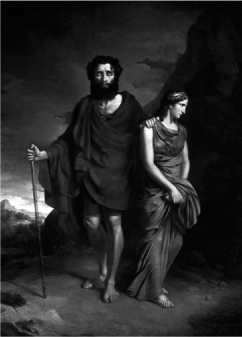Classical Greek MythologySophocles and the Oedipus Cycle |
What is the plot of Antigone? |
Antigone is of particular interest because it concerns the travails of a female protagonist, Antigone, the daughter of Oedipus. The play opens with Antigone bemoaning the fact that the king, Creon, has decreed that as a punishment for having fought against the state of Thebes, her brother Polynices is not to be allowed the formal burial required by religion. Polynices’ brother, Eteocles, who was just as guilty, has been properly buried. The new decree states that anyone going against it will be killed.
The chorus gives the audience the background of the story that has led to this unjust punishment. The two sons of Oedipus were to have alternately occupied the throne of Thebes, but unsatisfied with this arrangement, they had fought for supremacy, in spite of the obvious harm their war brought to Thebes. Finally the brothers succeeded only in killing each other, and Creon regained the crown he had originally taken after the disgrace of Oedipus. To settle the dispute between the dead brothers, he made a political decision to punish only Polynices.
Now Antigone appears. Distraught over the unburied state of her brother, she asks her sister Ismene to help her bury him secretly, but the more conservative and “law-abiding” sister refuses. Antigone determines to act alone, though with the loving moral support of Creon’s son, Haemon. Offstage she ritually buries her brother by putting some dirt on his body. Thus, she breaks the law for religious and family reasons. Caught by guards, she is brought before her uncle, Creon, the king, for judgment.
The middle of the play—the agon—is thus set up between Antigone as protagonist and Creon as antagonist, but good and evil are ambiguous here. Creon has made his probably wrong decision for good reasons—to preserve the broken state. Antigone has acted in the name of traditional family and religious rules and values. But she has broken the law. Both are right, both are wrong, and both are infected with the sin of the tragic hero—pride (hubris).
Because she refuses to give in to Creon’s pleas that she accept the law, Antigone is walled up and left to die. In her prison she commits suicide. Creon is punished for his pride when his son also commits suicide in support of Antigone.
The whole question of individual conscience versus the state laws is, of course, one that continues to concern and sometimes to bring great pain to human societies, which is perhaps why Antigone remains one of the most performed Greek tragedies in our day.

An 1828 painting by Antoni Brodowski of the blind Oedipus with his daughter Antigone.
